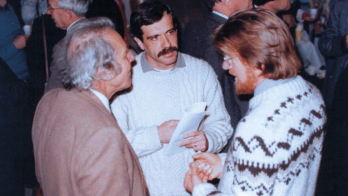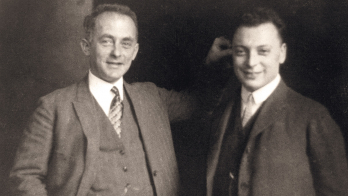by Jeremy Bernstein, Springer Science. Hardback ISBN 0387260056, €19.95 ($25).
Henri Poincaré and Relativity Theory by A A Logunov, Nauka. Hardback ISBN 5020339644.

Bernstein’s book is wonderful and, as far as I can judge as a professional physicist, very pedagogical for non-specialists. My only complaint is the title, which I came to understand only on page 163. For me, the “Old One” was Albert Einstein himself and the “secrets” were about his love affairs, including the one with the Russian girl who tried to extract atomic secrets from him (Einstein knew nothing). However, Bernstein gives only a relatively brief account of Einstein’s life; on this subject there are many other more complete books available. What the author does instead is to delve into the past, as far as antiquity if necessary, and give the background to the three fundamental papers Einstein published in 1905 – special relativity, Brownian motion and the photoelectric effect – and, in fact, beyond, since general relativity is also mentioned.
In the course of the book Bernstein gives a wonderful lecture on the history of physics and chemistry, with colourful details about the main contributors: Epicurus, Lucretius, Galileo, Kepler, Newton, Bernoulli (one of them), Dalton, Avogadro, Maxwell, Smoluchowski, Perrin, Michelson, Lorentz, Poincaré and so on.
This brings me to Logunov’s book about Henri Poincaré and relativity. The author claims that the role of Poincaré in the advent of relativity was much more important than is generally believed. This does not contradict Bernstein; he is also full of admiration for Poincaré in general and for his contribution to the genesis of relativity theory in particular. Max Born once said, “The theory of relativity resulted from the joint efforts of a group of great researchers: Lorentz, Poincaré, Einstein, and Minkowski.”
Einstein never mentioned the contribution of Poincaré, which was slightly anterior and when, says Bernstein, Abraham Pais lent the text of Poincaré to Einstein, the latter returned it later without a word. Somehow it looks as though Einstein had decided to ignore Poincaré, which is difficult to understand when you see them both less than a metre apart at the 1911 Solvay Congress. However it is unclear whether Poincaré made the “big jump”, while Einstein certainly did. In a text quoted by Logunov, Poincaré says “If we are to accept the relativity principle…”, that is, there is an “if”. It should be said, however, that according to Bernstein, Poincaré also ignored the work of Einstein, although he did write a letter of recommendation for Einstein to obtain a position at the Federal Institute of Technology in Zurich in 1909. In this letter Poincaré does not mention the word “relativity” once.
The question will remain forever open. Can we blame Einstein for ignoring Poincaré? No more than we can blame Bach for copying Vivaldi’s concerto for four violins to transform it into the concerto for four pianos.
Where I cannot follow Logunov is the part in which he claims that Einstein’s theory of general relativity is useless and wrong. Logunov presents explanations of the twin paradox and the Sagnac effect using only Poincaré’s relativistic mechanics, but he does not seem to realize that we now have extremely refined tests of general relativity, and that the global positioning system could not work without relativistic corrections.
To conclude, I would say that, since the paternity of the Brownian motion theory is also controversial (what was the role of Marian Smoluchowski?), and since the importance of the 1917 paper on induced radiation was only realized later with the invention of the laser, I believe that the Swedish Academy, contrary to what I thought when I was young, was very wise in awarding Einstein’s Nobel prize “for services in theoretical physics, and especially for his discovery of the law of photoelectric effect”. For this Einstein had no competitor. Ironically this work led to quantum mechanics, with which Einstein was so unhappy: “the Old One [God] does not play dice”.







